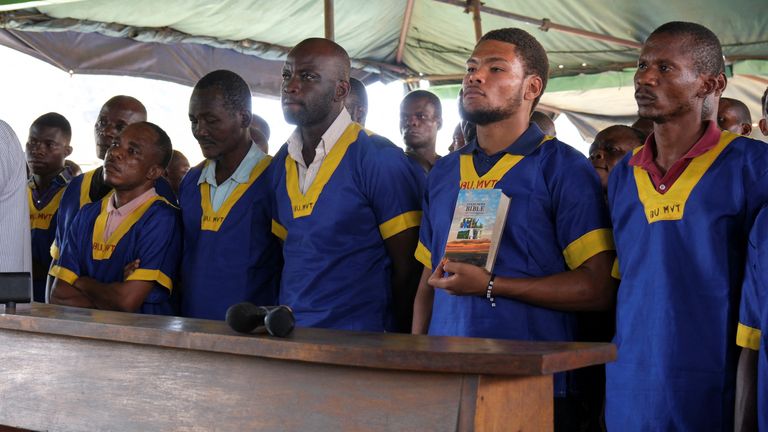37 Sentenced to Death in DR Congo Coup Plot: US and British Citizens Among Those Facing Execution
3 min read

In a dramatic turn of events, 37 individuals, including three Americans, a British citizen, a Belgian, and a Canadian, have been sentenced to death in the Democratic Republic of Congo (DR Congo) following a failed coup attempt against President Félix Tshisekedi. The group was found guilty of orchestrating an attack on both the presidential palace and the residence of a presidential ally in May.
The orchestrator of the plot, Christian Malanga, a U.S. national of Congolese descent, was killed during the assault, along with five accomplices. The trial, held in a military court and broadcasted nationwide, involved 51 defendants. Christian Malanga’s son, Marcel, one of the U.S. citizens sentenced to death, testified that his father had coerced him into participating in the coup under threat of death. His friend Tyler Thompson, also sentenced to death, had known Malanga from their days playing football together in Utah. Tyler’s stepmother, Miranda Thompson, expressed her family’s bewilderment at his involvement, revealing their shock and reliance on online information for updates.
The third American, Benjamin Zalman-Polun, had business dealings with Malanga and was also sentenced to death. Jean-Jacques Wondo, a dual Congolese-Belgian national, was among those condemned. Human Rights Watch has previously highlighted Wondo’s significant role as a researcher on regional politics and security, suggesting that the evidence linking him to the coup attempt was tenuous at best.
Reports from AFP indicate that the British and Canadian nationals involved were of Congolese origin. Youssouf Ezangi, the British citizen, was implicated in recruiting other conspirators.
Out of the 51 individuals tried, 14 were acquitted and released, with the court determining that they had no involvement in the coup attempt. The remaining convicted individuals have five days to appeal their sentences.
Despite the death sentences, DR Congo has not executed anyone for nearly twenty years; instead, those sentenced to death are typically imprisoned for life. The government lifted its moratorium on the death penalty in March, citing the need to address “traitors” within the military. However, no executions have been carried out since this policy change.
The coup attempt began in Kinshasa in the early hours of May 19. Armed men initially targeted the home of parliamentary speaker Vital Kamerhe before advancing to President Tshisekedi’s official residence. Reports indicate that about 20 attackers in military uniforms engaged in a firefight at the palace. An army spokesperson later announced on national television that security forces had thwarted the coup attempt.
Local media identified the assailants as members of the New Zaire Movement, associated with Christian Malanga, an exiled Congolese politician. Malanga was reportedly shot during the attack after resisting arrest, according to Brigadier General Sylavin Ekenge.
President Tshisekedi, who was re-elected in December of the previous year with approximately 78% of the vote, has faced persistent challenges in governing. Despite DR Congo’s rich mineral resources and large population, the nation struggles with conflict, corruption, and ineffective governance. Efforts to stabilize the country, particularly in the resource-rich eastern regions plagued by violence, have included imposing states of siege, negotiating ceasefires, and deploying troops from neighboring countries.
The coup attempt and subsequent trial underscore the ongoing volatility in DR Congo, highlighting the deep-seated issues that continue to affect the country’s stability and governance.